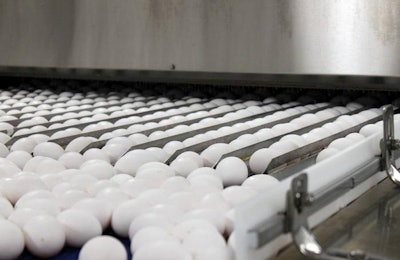
Cal-Maine Foods reported a decline in net earnings and net sales for the third quarter of fiscal year 2020. The results for the quarter, which ended on February 29, were released on March 30.
Net sales for the third quarter of fiscal 2020 were $345.6 million, a 10.0 percent decrease, compared to $384.0 million for the third quarter of fiscal 2019. The company reported net income of $13.7 million, or $0.28 per basic and diluted share, for the third quarter of fiscal 2020, compared to net income of $39.8 million, or $0.82 per basic and diluted share, for the third quarter of fiscal 2019.
For the 39 weeks ended February 29, net sales were $898.3 million compared to $1,080.6 million for the prior-year period. The company reported net loss of $42.1 million, or $0.87 per basic and diluted share, for the thirty-nine weeks ended February 29, 2020, compared to net income of $74.0 million, or $1.53 per basic and $1.52 per diluted share for the year-earlier period.
“Our results for the third quarter of fiscal 2020 reflect more challenging market conditions than we experienced for the same period last year. However, we were pleased with our ability to execute our strategy in this environment and return to profitability for the quarter,” Dolph Baker, chairman and chief executive officer of Cal-Maine Foods, stated in a press release.
“While our sales volumes were in line with last year, our overall sales revenue was down due to the lower average selling prices compared with the same period of fiscal 2019. The Southeast large market average price for conventional eggs dropped 13.8 percent for the third quarter of fiscal 2020 compared to the third quarter of fiscal 2019, while our average sales price was down 10.0 percent. Since the end of the third quarter, market prices have moved significantly higher to record levels, and we expect to see continued price volatility through the end of our fiscal year.”
Struggles with specialty egg sales
For the third quarter, Cal-Maine’s specialty eggs, excluding co-pack sales, were $117.7 million, accounting for 35.0 percent of the company’s sales revenue, compared with $131.1 million, or 35.0 percent of sales revenue, in the third quarter of fiscal 2019. Average pricing for specialty eggs was down by 3.4 percent to $1.89 per dozen in the third quarter compared to the prior-year third quarter. Specialty dozens sold were also down 7.1 percent, as sales of specialty dozens were negatively affected by low conventional egg prices.
“An unfavorable balance of egg supply and demand continued to adversely affect market prices during the third quarter and year-to-date periods,” said Baker.
However, Baker noted that hen numbers, as reported by the USDA Chickens and Eggs report on March 23, 2020, were 330.0 million, which is 11.8 million less hens than reported a year ago. The USDA also reported that hatch rates decreased 4.95 percent for the last three consecutive months through February 2020, including a 8.0 percent decrease in February, as compared to the same period in the prior year.
"We have worked hard to prepare Cal-Maine Foods to meet future customer requirements and the expected additional demand for cage-free eggs. This demand has been supported by legislation in California, Washington and Oregon requiring cage-free eggs, as well as three other states with similar laws defining minimum space requirements,” said Baker. “We are committed to meeting the demands of our customers, and we have invested over $344 million to expand our cage-free production starting with our first facility in 2008. We are pleased with our progress to date, with expansion projects underway in Florida, Texas and Utah, which will provide significant additional processing, pullet and cage-free capacity upon completion.”
COVID-19 impact on Cal-Maine Foods
Baker spoke cautiously concerning current ongoing uncertainties and supply chain disruptions related to the coronavirus pandemic and geopolitical issues surrounding trade agreements and international tariffs could create more price volatility in the future.
“Looking ahead into the fourth quarter of fiscal 2020 and fiscal 2021, we believe we are taking all reasonable precautions in the management of our operations in response to the outbreak of COVID-19. To date, Cal-Maine Foods facilities are operating normally, and we have not experienced any supply chain or delivery disruptions,” said Baker.
“Our top priority is the health and safety of our employees, who work hard every day to produce eggs for our customers. As part of the nation’s food supply, we work in a critical infrastructure industry, and we have a special responsibility to maintain our normal work schedule. As such, we are providing supplemental pay to all of our employees to assist them and their families at this critical time. We are in daily communications with our managers across our operations and continue to closely monitor the situation in the communities where we live and work.”
Cal-Maine Foods, according to the press release, is following published guidelines by the Centers for Disease Control (CDC) and other government health agencies in implementing procedures to protect its employees, and the company has strict sanitation protocols and biosecurity measures in place throughout its operations with restricted access to visitors. All non-essential corporate travel has been suspended.
“During these challenging times, we want to thank all of our employees and supply chain partners who support our ability to continue to produce and deliver eggs to our customers and consumers,” said Baker. “For those who have been affected by COVID-19, we express our heartfelt sympathy and hope for their full recovery. We are also grateful for all the healthcare professionals, first responders, and state and local health officials who are working tirelessly to protect the health of all of us. As this rapidly evolving situation develops, we are committed to continuing to take the necessary steps to protect the health and safety of our employees, customers and other stakeholders.”
View our continuing coverage of the coronavirus/COVID-19 pandemic.
















